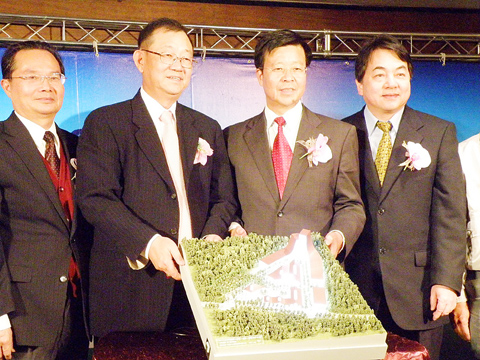Taiwan Land Development Corp (台灣土地開發公司) yesterday signed a 50-year build-operate-transfer (BOT) agreement with the Kinmen County Government, promising to turn the former war-torn island into an international tourism and leisure spot in five years with an initial budget of NT$3.69 billion (US$113.3 million).
“We hope that when the project is completed, it will bring in tens of billions [of New Taiwan dollars] in economic benefits to Kinmen,” Kinmen County Commissioner Lee Chu-feng (李炷烽) told a signing ceremony.
The project will create 1,500 job opportunities, more than 60 percent of which will be reserved for local residents, he said.

PHOTO: WANG LIANG-YUN, TAIPEI TIMES
That excludes workers that will be employed during the project’s construction, the land developer said.
The BOT project covers a 7.45 hectare lot 200m north of Kinmen Shanyi Airport, where a hotel, exhibition and conference halls, bonded warehouses, recreation and shopping malls, as well as a duty-free shop will be built starting next year and completed in three to five years.
Taiwan Land Development chairman Chiu Fu-sheng (邱復生) said the entire project could cost up to NT$10 billion, 50 percent of which would come from company funds and the remaining 50 percent would be raised from investors at home and abroad.
Chiu said institutional investors or property developers in Hong Kong, China and the US had expressed interest in taking part in the project. He did not elaborate, citing confidentiality.
Seven retailers, including duty-free Ever Rich DFS Corp (昇恆昌), Hsin Tung Yang Co (新東陽) and local specialty shops such as Sheng Zu Food and Beverage Corp (聖祖食品) and knife manufacturer Master Wu Co (金合利鋼刀), have agreed to set up outlets in the leisure district there, the developer said.
Taiwan Land Development president Andy Lai (賴昭輝) said that the soon-to-be-built hotel would be a three or five-star establishment with 300 to 500 rooms.
He estimated that the 50-year project could contribute a minimum of NT$2.4 billion in tax revenue to the county government, while potential tourism revenue could reach at least NT$2 billion per year.
If the estimated 1.7 million visitors traveling via the “small three links” — with the number forecast to rise to 2 million in two years — were to spend NT$1,000 each, the county government could get a revenue boost of NT$2 billion per year, he said.
Moreover, if 1 percent to 10 percent of 21 million tourists traveling to Xiamen, China, could extend their trip to include Kinmen at a cost of NT$10,000, the county government could further see an income of between NT$2.1 billion to NT$21 billion each year, he added.
Lee said Kinmen now attracts about 500,000 tourists per year, including 150,000 Chinese tourists since late last year, including 50,000 who stayed overnight.
High-quality kaoliang liquor, which is sold for 300 yuan (US$44) in Kinmen and 1,188 yuan in China, is popular among Chinese tourists.

TARIFFS: The global ‘panic atmosphere remains strong,’ and foreign investors have continued to sell their holdings since the start of the year, the Ministry of Finance said The government yesterday authorized the activation of its NT$500 billion (US$15.15 billion) National Stabilization Fund (NSF) to prop up the local stock market after two days of sharp falls in reaction to US President Donald Trump’s new import tariffs. The Ministry of Finance said in a statement after the market close that the steering committee of the fund had been given the go-ahead to intervene in the market to bolster Taiwanese shares in a time of crisis. The fund has been authorized to use its assets “to carry out market stabilization tasks as appropriate to maintain the stability of Taiwan’s

STEEP DECLINE: Yesterday’s drop was the third-steepest in its history, the steepest being Monday’s drop in the wake of the tariff announcement on Wednesday last week Taiwanese stocks continued their heavy sell-off yesterday, as concerns over US tariffs and unwinding of leveraged bets weighed on the market. The benchmark TAIEX plunged 1,068.19 points, or 5.79 percent, to 17,391.76, notching the biggest drop among Asian peers as it hit a 15-month low. The decline came even after the government on late Tuesday authorized the NT$500 billion (US$15.2 billion) National Stabilization Fund (國安基金) to step in to buoy the market amid investors’ worries over tariffs imposed by US President Donald Trump. Yesterday’s decline was the third-steepest in its history, trailing only the declines of 2,065.87 points on Monday and

TARIFF CONCERNS: The chipmaker cited global uncertainty from US tariffs and a weakening economic outlook, but said its Singapore expansion remains on track Vanguard International Semiconductor Corp (世界先進), a foundry service provider specializing in producing power management and display driver chips, yesterday withdrew its full-year revenue projection of moderate growth for this year, as escalating US tariff tensions raised uncertainty and concern about a potential economic recession. The Hsinchu-based chipmaker in February said revenues this year would grow mildly from last year based on improving supply chain inventory levels and market demand. At the time, it also anticipated gradual quarter revenue growth. However, the US’ sweeping tariff policy has upended the industry’s supply chains and weakened economic prospects for the world economy, it said. “Now

Six years ago, LVMH’s billionaire CEO Bernard Arnault and US President Donald Trump cut the blue ribbon on a factory in rural Texas that would make designer handbags for Louis Vuitton, one of the world’s best-known luxury brands. However, since the high-profile opening, the factory has faced a host of problems limiting production, 11 former Louis Vuitton employees said. The site has consistently ranked among the worst-performing for Louis Vuitton globally, “significantly” underperforming other facilities, said three former Louis Vuitton workers and a senior industry source, who cited internal rankings shared with staff. The plant’s problems — which have not